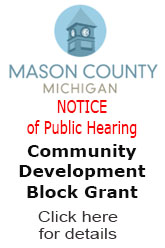By Rob Alway. Editor-in-Chief.
Mason County’s Prosecuting Attorney, Paul Spaniola, has tried some pretty high profile cases lately. The 55-year-old Pere Marquette Township resident has served as the county’s top law enforcement official since 2009. He joined the prosecutor’s office in 2001 as an assistant prosecutor. Prior to that he operated a private practice in Ludington specializing in criminal defense, family law, real estate, general civil practice, probate and estate planning, and personal injury.
Spaniola chairs the Mason County Concealed Pistol License Board and the Mason County Child Death Review Team. Since 2012 he has been a member of the Board of Directors of the Prosecuting Attorneys Association of Michigan (PAAM) where he sits on the Technical Services Committee, Training and Education Committee, and Outreach Committee. In 1988-1989 he was president of the Mason – Lake County Bar Association.
He has also served as an adjunct professor at West Shore Community College Law Enforcement Program. He has been a registered referee with the United States Soccer Federation and the Michigan High School Athletic Association since 1997. Service organizations that he has been involved with in his 30 year professional career include the Ludington Area Foundation, Area 24 Special Olympics, Ludington Recreation Soccer Board, and the Ludington Area Jaycees.
He resides in Ludington with his wife, Pat, who is a retired teacher from the Ludington Area Schools. They have two grown sons, Charlie and Jeff. Paul Spaniola is a graduate of Central Michigan University and the University of Toledo College of Law. He was admitted to the bar in 1984.
MCP: What do you believe to be the root causes for the high numbers of repeat offenders? What change can the court system make to reduce these numbers?
PS: I think the large number of repeat offenders is in proportion of people who have long term alcohol substance abuse problems, lack of education and lack of marketable job skills. Without job skills and education they are essentially unemployable. They have a lot of time on their hands which leads to problems.
Probation and substance abuse treatment and job and educational requirements are imposed in virtually every felon case (substance abuse if indicated). And, they can only do what they can.
MCP: Do you believe the composition of juries adequately and fairly reflects society at large? Why or why not? If not, what can we do to change this?
PS: I believe in Mason County the juries reflect our society. The jury commission does a good job and I think the juries are selected fairly and accurately. They depict socio-economic groups we have in our community including race, age, employment and gender. I think it’s a very good cross section. I can’t really speak to Lake County, though.
MCP: Do you have a plan regarding improving court procedures and efficiency?
PS: I would like to see more transparency in the court records. I have not discussed this with the county clerks but I would like to see more availability of the records online. It’s going to take money and it’s going to take software. From my experience, Mason County courts are very transparent right now but the information is not available online.
MCP: What do you perceive as the greatest obstacles for justice, if any?
PS: Justice for whom? As prosecutor, it is my obligation to do justice for all in the system including the defendants and the victims. That is an obligation that defense attorneys nor judges have. The prosecutor can dramatically affect an individual’s life. That is an immense power the prosecutor has, whether to charge a suspect and what do you charge the suspect with. It is very similar to what judges have to do to achieve justice. It doesn’t make you popular but you have got to do the right thing, which is not necessarily the easy thing.
MCP: What criteria would you use for deciding whether to impose or affirm sentences outside of standard ranges?
PS: The vast majority of sentences that come through Mason County’s courts are within the state guidelines. There are a few I have made plea agreements with that are outside the guidelines. I definitely look at several factors. Are there problems that are seen with the victims in which the victim would be more adversely affected if the sentencing was within the guidelines? Do the guidelines underestimate what the defendant had done to the victim? I strive to go in the middle of the guidelines most of the time. In the Sean Phillips unlawful imprisonment trial (Baby Kate case) Judge Cooper went outside the guidelines. As prosecutor I saw fit to recommend the minimum sentence be longer than the guidelines. Judge Cooper saw fit to affirm it and the appeals court also agreed.
MCP: Do you believe there is such a thing as a “victimless crime?”
PS: No I don’t think there is such a thing as a victimless crime. There are certain situations when the victim isn’t notified on, such as certain drug cases. But there is certainly an impact on our community when drugs are involved.
MCP: As a prospective judge, what do you consider your greatest strengths?
PS: My experience. I have 30 years experience as an attorney. For 30 years I have practiced law in Mason County. I have performed community service to Mason and Lake counties. I have more legal experience than all of the other candidates for this position combined. I also believe my strengths are the type of experience I have. I worked 17 years in private practice, including 17 years in criminal defense, 17 years in civil work, 17 years in divorce and 17 years in real estate. I have been a prosecutor for 13 years. That covers all the bases. The other candidates have done that work but not to the depth that I have.
MCP: Describe your most difficult case.
PS: The shooting of Michigan State Police Trooper Paul Butterfield was a tough one because of all the emotions that were involved. I did not have a close personal relationship with Paul but I did work with him on a professional level. It was very difficult and I tried not to get too personally involved.
MCP: What are the pros and cons of going to the bench as compared to practicing law?
PS: One of the advantages is instead of doing all the hard work outside the court to make a presentation — while as a judge you have work on the outside but it’s not the same type of work — whether or not the PowerPoint presentation is going to work, or the recording is going to play. The disadvantage is while you are dealing with people, you are dealing with them in a different context. You have to be a neutrally detached fact finder. You don’t have the ability to direct the investigation on a case. You can ask the questions of what you would like to see done or why wasn’t something done, but you can’t direct.
MCP: What is your general judicial philosophy?
PS: I expect attorneys to come prepared for court. They are being well compensated by their clients and I expect that they would be prepared. They need to do their work outside of court so that the other side of the case is not being inconvenienced. I think Judge (Richard) Cooper does an excellent job in relaying these expectations. In the last 30-some years, since he was first elected in 1979, he has given everyone their fair say, victims, defendants and defense attorneys. There are courts in other counties where everything is decided in chambers ahead of time. I don’t think that is a good method. Everybody deserves to have their day in court. Like Judge Cooper, I will be fair to all parties. Everyone will get their say and I they won’t feel they are being short-changed.
I also would like to embrace technology and use it when it benefits us but not use technology just for technology’s sake.



















.jpg)




























.png)












